Larinus turbinatus
Larinus turbinatus is a species of true weevil in the family of beetles known as Curculionidae.[2][3][4]
| Larinus turbinatus | |
|---|---|
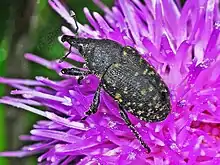 | |
| Larinus turbinatus on thistle flower | |
| Scientific classification | |
| Domain: | Eukaryota |
| Kingdom: | Animalia |
| Phylum: | Arthropoda |
| Class: | Insecta |
| Order: | Coleoptera |
| Infraorder: | Cucujiformia |
| Family: | Curculionidae |
| Genus: | Larinus |
| Species: | L. turbinatus |
| Binomial name | |
| Larinus turbinatus Gyllenhal, 1835 | |
| Synonyms | |
| |
Etymology
The genus name Larínus (from ancient Greek λαρίνος, fat ) refers to the rounded body shape. The Latin species name turbinātus, means "cone-shaped" and refers to the shape of the snout.
Distribution
This species is native to western Palaearctic and it is present in southern and central Europe (Albania, Austria, Bosnia and Herzegovina, Bulgaria, Croatia, Czech Republic, France, Germany, Greece, Hungary, Italy, Republic of Moldova, Poland, Portugal, Romania, Slovakia, Slovenia, Spain, Switzerland, Ukraine and Yugoslavia),[5] Caucasus, western Russia, Asia Minor, Central Asia, Siberia and North Africa. It has been introduced in United States. [6][7]
Habitat
These warmth-loving weevils manly occur on open, warm slopes, in grassland, wet meadows and pastures, where thistles are also present. [6]
Description
Larinus turbinatus can reach a body length of about 4.00–9.00 mm (0.157–0.354 in).[1][6] These weevils have a robust, oval, black body with a with many patches of gray setae, that appear yellowish by a yellowish secretion and adhering pollen. Its antennae are short with conspicuous clubs. The female's head and rostrum are blacker than those of the male.
The pronotum is transverse, rounded and strongly punctured, with tapering lateral margins. The elytra are irregularly covered with hair and finely striate. They are wider than the pronotum and have a rounded apex. The rostrum is robust, short and straight, conically tapering to apex. It shows a latero ventral ridge with a longitudinal groove. This species is similar in size and can be confused with Larinus carlinae.
Biology
The females of Larinus turbinatus lay five to six eggs per day, each on one flower bud. If occurs that several females lay the eggs on the same flower head. The stronger larvae kill the weaker larvae, so that in the last larval stage, there is usually only one larva per flower. [8] Pupation also takes place in the thistle blossom.
These diurnal weevils are oligophagous on various thistle species of the genera Carduus and Cirsium (family Asteraceae, tribe Cardueae), especially on Marsh Thistle (Cirsium palustre), Creeping Thistle (Cirsium arvense), Musk Thistle (Carduus nutans) and Cabbage Thistle (Cirsium oleraceum). They are occasionally observed on Silybum, Onopordum and Centaurea species. [1][3][6]
Gallery
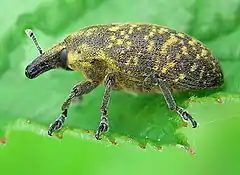 Side view
Side view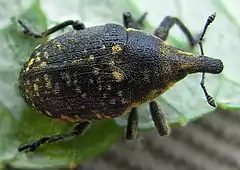 Dorsal view
Dorsal view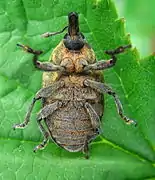 Ventral view
Ventral view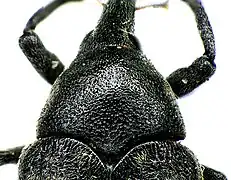 Close-up of pronotum
Close-up of pronotum
References
- Biolib
- Catalogue of Life
- Bug Life
- NCBI
- Fauna Europaea
- Hoebeke E.R., Spichiger S.E Larinus turbinatus Gyllenhal (Coleoptera: Curculionidae: Lixinae), a Eurasian weevil new to North America with a summary of other adventive Larinus in North America and a key to species Proc. Ent. Soc. Wash. 118: 261-272, 2016
- GBIF
- Étienne Rabaud: VI, L'"Instinct de l'isolement" chez les Insectes [archive]. L'Année psychologique, vol. 19, numéro 19, pp. 194–217 (1912 (in French))
Further reading
- Alonso-Zarazaga, Miguel A.; Lyal, Christopher H.C. (1999). A World Catalogue of Families and Genera of Curculionoidea (Insecta: Coleoptera) (Excepting Scotylidae and Platypodidae). Entomopraxis. ISBN 84-605-9994-9.
- Arnett, R.H. Jr.; Thomas, M. C.; Skelley, P. E.; Frank, J. H., eds. (2002). American Beetles, Volume II: Polyphaga: Scarabaeoidea through Curculionoidea. CRC Press. ISBN 978-0849309540.
- LeConte, J.L. (1861). Classification of the Coleoptera of North America. Smithsonian Miscellaneous Collections. Vol. 3. Smithsonian Institution. doi:10.5962/bhl.title.38459. ISBN 0665100558.
- O'Brien, Charles W.; Wibmer, Guillermo J. (1982). "Annotated checklist of the weevils (Curculionidae sensu lato) of North America, Central America, and the West Indies (Coleoptera: Curculionoidea)". Memoirs of the American Entomological Institute (34).
- White, Richard E. (1998) [1983]. A Field Guide to the Beetles of North America (Peterson Field Guides). Houghton Mifflin Harcourt. ISBN 0395910897.